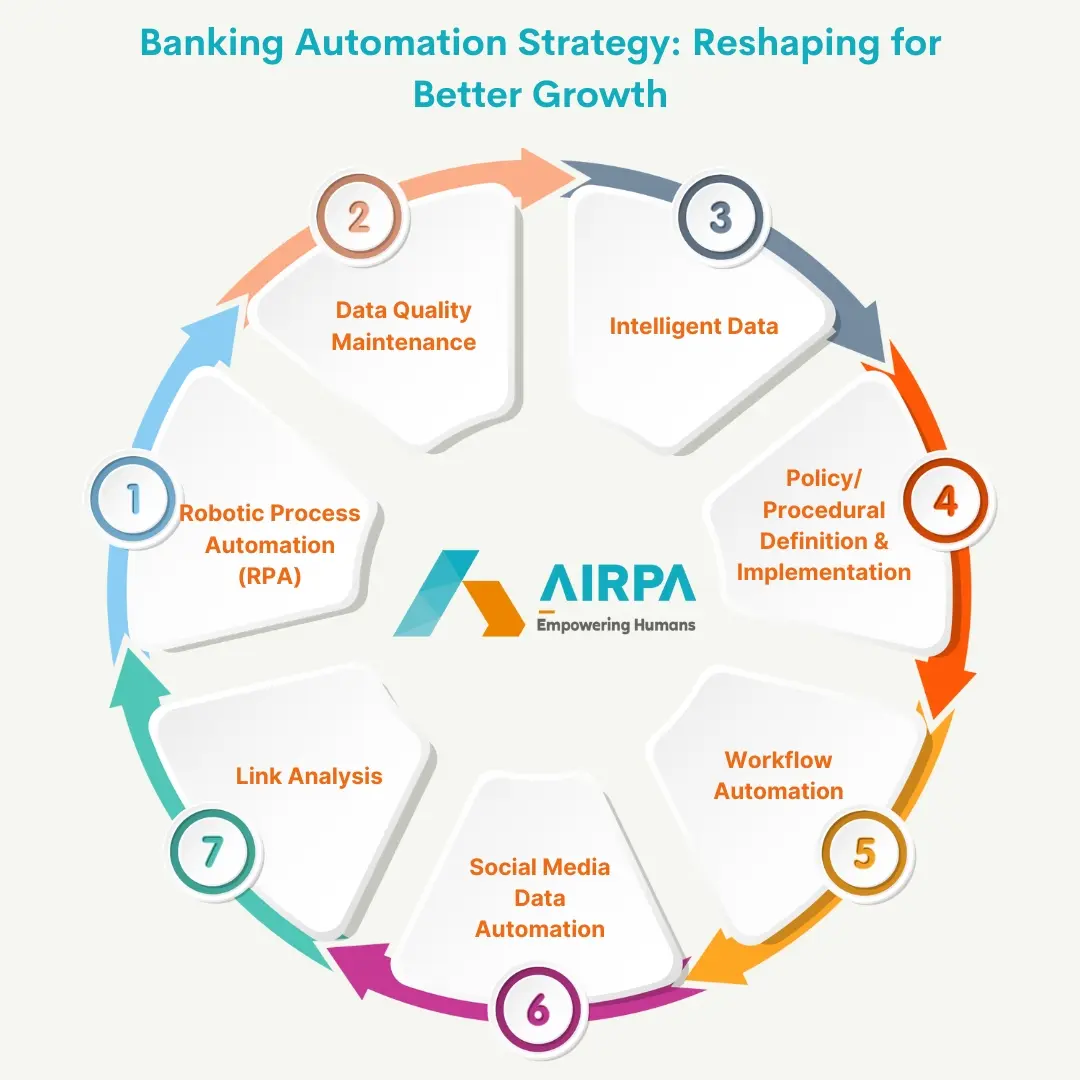
Banking Automation Strategy: Optimal Reshaping for Better Growth

Table of Contents
Imagine a world where your banking experience is seamless, error-free, and incredibly efficient. That's the power of automation, and it's transforming the financial sector as we know it.
Talk to Our Automation Expert!
+91 855-975-9735
Want to experience Intelligent Automation in Action or Need help Building the Right Automation Plan?
In response to the growing demand for cost-effective, streamlined, and precise automated services, automation technologies have undergone significant advancements over the past few years. This maturation has made automation a much more feasible option for banks and financial institutions – a key that unlocks not only cost-efficient growth but also the enduring trust of customers.
Increasingly popular, automation now provides advanced operational analytics and technical viability without complex interfaces. These solutions come at more affordable prices than previous approaches, making automation a compelling choice for banks.
Why are Banks Embracing Automation?
Banks are turning to automation for good reasons. Banking has many repetitive, tedious tasks that waste employees' and customers' time. These inefficiencies cost banks a lot each year, estimated around 20-30% of their revenue. Trying to use old-fashioned manual processes in today's digital world affects overall profits and provides a poor customer experience. Automating these manual tasks with AI and RPA, on the other hand, can make banking smoother and faster. Automation streamlines workflows, increases efficiency, allows better customer service, and saves money. By using automation, banks can work smarter, not harder, compared to sticking with outdated manual methods.
Among the most applicable automation techniques for financial service organizations, seven stand out, let’s check out:

1. Robotic Process Automation (RPA)
RPA emerges as a powerful solution for organizations seeking to reduce costs while enhancing the speed and precision of their operations. This technology holds remarkable potential for boosting accuracy and operational efficiency across a bank's front, middle, and back-office functions by minimizing or eliminating manual tasks. RPA shines particularly bright when deployed for high-volume, checklist-driven tasks that are repeatable and well-documented, enabling seamless automation of routine processes.
2. Data Quality Maintenance
Maintaining master data can be challenging for many firms, despite the importance of having a comprehensive customer picture. To do this, financial services businesses seek assistance in aggregating data and delivering a comprehensive customer perspective across data sources via an automated programmatic layer, which can be an effective tool for ensuring data quality.
3. Intelligent Data
Context-aware data can be used to improve and accelerate results. This type of automation will fill data and regulatory gaps without requiring human intervention.
4. Policy/Procedural Definition and Implementation
To comply with regulatory requirements or relevant policies/procedures, data gaps can be recognized in the information gathering process and automated warnings can be issued for finishing the process and increasing the quality of the submission. This eliminates processing delays by establishing event monitors and testing the status of the event in the case management system. Once installed, the system will perform particular activities, and your firm can be confident that data collection methods will comply with regulatory and process standards.
5. Workflow Automation
This technique enables the seamless integration of document analysis, behavioral patterns, and data from multiple sources to automate the generation of documents, reports, audit trails, and notifications. Tasks that typically get stuck in individuals' inboxes for extended periods, causing delays due to inaction, can be automatically assigned and processed, ensuring efficient workflow.
6. Social Media Data Automation
Automating the analysis of social media content has become increasingly crucial for financial services monitoring. Customers provide profile data, and many platforms share information through single sign-on APIs. Automated processes can track changes in behavior, profile details (such as addresses), and analyze unique information patterns from news, social media, and web sources. This automation allows financial institutions to leverage valuable insights derived from diverse social data.
7. Link analysis
This automation approach proves invaluable for investigations, research, and reviews within financial institutions. By performing link analysis, organizations can gain a unified perspective on the relationships between customers and all of their accounts, both internal and external. This capability enables the identification of customer connections with high-risk entities, such as individuals or organizations with dubious backgrounds, criminal histories, or links to questionable jurisdictions. Moreover, analyzing the ultimate beneficial ownership of companies and incorporating this type of data into customer segmentation and scoring models provides valuable insights. Ultimately, automating these processes empowers financial institutions to make informed decisions based on comprehensive customer intelligence.
How Can AIRPA Help in Banking Automation?
In today's fast-paced world, banks require a smarter and more efficient approach to data capture and document processing. We provide user-friendly intelligent automation tools designed to supercharge your automation capabilities while maintaining control over critical information with unparalleled speed and accuracy.
Our cutting-edge intelligent process automation solution automates mundane document oriented processes as they enter your organization, enabling you to seamlessly handle and extract data from diverse sources, making it readily usable across your entire enterprise. By harnessing the power of our automation tools, you can streamline processes, enhance productivity, and gain a competitive edge in the financial sector.
Popular Tags:
Related Articles

How Automation and AI are Reshaping the Fintech Landscape
Is AI the driving force behind fintech's rapid evolution?





